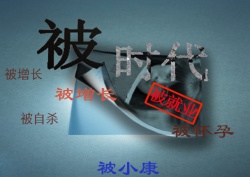“Passive era”的版本间的差异
来自China Digital Space
| 第7行: | 第7行: | ||
See also [[be X-ed]]. | See also [[be X-ed]]. | ||
| − | [[Category: Grass-Mud Horse Lexicon]] [[Category: Prison and Law Enforcement]] [[Category: | + | [[Category: Grass-Mud Horse Lexicon]] [[Category: Prison and Law Enforcement]] [[Category: Quotable Communist Party]] [[Category: Chinese Society and Popular Culture]] |
2015年5月22日 (五) 16:53的版本
被时代 (bèi shídài): passive era

Will you be “made relatively well-off,” or will you be “suicided”? (Source unknown)
A time when euphemistic labels are given to actions that belie the underlying compulsion behind those actions—that is, the present.
In Chinese, the grammatical construction 被X (bèi-X) means “to be X-ed,” and implies that that the X-ed party is unwilling or will suffer from the effects of X. For example, someone invited to drink tea (i.e. called in by the police for interrogation) could say she “was tea-drinked” (被喝茶 bèi hé chá). The current frequency of such situations has given rise to the term “passive era.”
See also be X-ed.




